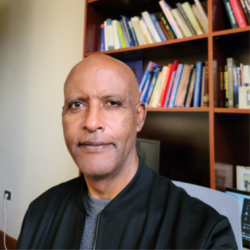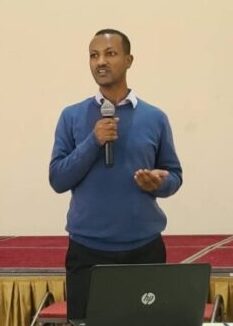Authors:

Dr. Menelik Desta, Executive Director, Ethiopian School Readiness Initiative

Professor Belay Kibret, Addis Ababa University
The Ethiopian Together for Early Childhood Evidence (T4ECE) country task force team, under the leadership of the Ethiopian School Readiness Initiative (ESRI), recently established a Knowledge Hub to support collaboration and alignment among early childhood actors in Ethiopia. The Knowledge Hub aims to improve the effectiveness of early childhood resource development and reduce duplication, as well as to demonstrate strengths and identify gaps in existing resources to stimulate further work, dialogue, and research for Early Childhood Development and Education (ECDE) in Ethiopia.
In this blog, we hear from Dr. Menelik Desta, Executive Director of ESRI, and Professor Belay Kibret of Addis Ababa University as they discuss the T4ECE task force team’s experience in synthesizing and compiling ECDE evidence and resources in Ethiopia.
Why did the T4ECE team decide to focus on the Knowledge Hub? Why was this important to Ethiopia? What did your team hope to achieve with this?
When T4ECE consortium members in Ethiopia were asked about their priorities to help advance ECDE services in the nation, our team focused on developing a Knowledge Hub for ECDE resources. While many providers offer various ECDE services in Ethiopia, they often operate in silos, and no one has the exact information regarding who is doing what. Therefore, the Ethiopian T4ECE country task force team saw the curation of existing information about services and research regarding early childhood development and education in the country as a priority and as a stepping stone for all other preventive, curative, and promotional interventions by stakeholders.
What work went into the Knowledge Hub and who has been involved?
Once the Knowledge Hub was agreed upon as an important project, Addis Ababa University (AAU) and the National Educational Assessment and Examination Agency (NEAEA) took the responsibility of collecting the resources. The resources included policies and strategies, curricular materials, practices, research outputs, tools and measures, and books related to ECDE. The T4ECE team guided the project in several ways, while ESRI administered the whole process. USAID and ECD Measure also extended financial and technical support.
At the outset, tools, formats, and protocols were developed to identify and document the resources. Then, organizations were identified that provide resources in ECDE in Ethiopia. Finally, resource collectors were identified and trained, followed by piloting and adjustments made to the protocols. After completing the two resource collection phases, the research team compiled basic data for each resource and submitted the resource profiles to the ICT team so they could upload data about the resources to the Knowledge Hub database.
Several workshops were conducted to gather feedback from key stakeholders on the Knowledge Hub. Workshop attendees included officials and professionals from the Ministries of Education and Health of Ethiopia, professionals from Addis Ababa University, officials and professionals from USAID-Ethiopia, World Bank-Ethiopia, UNICEF-Ethiopia, Save the Children Ethiopia, and local governmental and non-governmental organizations. Besides comments from the workshops, ECD Measure staff had frequent online meetings with the country task force and the research and ICT teams to discuss progress and the design of the Knowledge Hub.
What was the most interesting thing you learned in the process?
We have learned that there are many actors who have been directly engaged in contributing to the health, development, and learning of children in Ethiopia. However, the resources they have produced were previously not well documented. Still, we were able to collect over four hundred diverse resources. The most interesting thing we have learned is that most of these different actors are willing to work together, learn from one another, and make use of the collected resources for their future work. A committee composed of five organizations was formed during the final workshop to help facilitate this collaboration. The committee will establish a network of organizations working on early childcare and education in Ethiopia.
What was the most challenging aspect of this project?
In some cases, getting resources from organizations was challenging. While most organizations we approached were willing to share their resources, the research team had to make repeated visits to convince some hesitant organizations to share resources. Some organizations were not willing to share their resources, and some provided partial resources.
One of the primary interests of the Together for Early Childhood Evidence consortium is to understand how early childhood systems can better use data to improve young children’s early learning experiences. What is your vision for how the Knowledge Hub will be used by local stakeholders to improve Ethiopia’s early childhood sector?
Stakeholders can learn from the resources available on the Hub about what is being done in Ethiopia regarding different aspects of ECDE. Interested stakeholders can use the data to know what information is missing and what needs more input to better promote healthy and effective ECDE in Ethiopia. The Hub can also help stakeholders identify and address common ECDE problems.
Reflecting on the future of the ECDE Knowledge Hub, what are you most excited about?
It is exciting to know that anybody interested in ECDE in Ethiopia now has a platform that can provide timely, focused, and evidence-based resources that can help cover unaddressed gaps. Knowing that stakeholders now have more support in determining whether the services they are considering are the right ones, helping to avoid the unnecessary use of resources, and avoiding duplication, is also very encouraging. It is also exciting to know that there is now a Knowledge Hub on ECDE where people can readily access the information they need. Now, individuals and organizations can share their outputs and outcomes and gain more recognition for their efforts.
What advice would you give to other countries looking to gather and synthesize country-level ECDE evidence?
We advise other countries to prioritize understanding their existing knowledge/practice based on ECDE and move forward from there. Thanks to the Knowledge Hub, Ethiopia now has access to more evidence on what has been done so far and we are able to suggest to policymakers, practitioners, and researchers what should be done to help young children benefit from the investments of different organizations.
Learn more about the Knowledge Hub here.
Ruth Namara from Unbounded Associates provided editorial support and coordination for this blog.
